#Rhine Federation
Explore tagged Tumblr posts
Text
Bora

Artist: Snow_is
Voice Actor: Tanaka Minami
The Azure Girls' team hacker, she is lazy and arrogant. Confidentially referring to herself as "the Genius Beauty of Hacking" she has the talent to back up her boldness. However, her true ambitions lie not within hacking, but in e-sports instead.







The "Azur Girl"'s personal hacker. A lazy, arrogant digital warrior, she refers to herself as the Genius Beauty of Hacking - and truly is extremely talented. Rather than a hacker, however, her true wish is to become and e-sports competitor.
0 notes
Text
Travel the World of Imagination: Journeys Beyond Border
Kieth Denmark M. Retes | BSIT1A OVERVIEW:
Switzerland originates from the Old Swiss Confederacy established in the Late Middle Ages, following a series of military successes against Austria and Burgundy; the Federal Charter of 1291 is considered the country's founding document. Swiss independence from the Holy Roman Empire was formally recognized in the Peace of Westphalia in 1648. Switzerland has maintained a policy of armed neutrality since the 16th century and has not fought an international war since 1815. It joined the United Nations only in 2002 but pursues an active foreign policy that includes frequent involvement in peace building.
Switzerland is the birthplace of the Red Cross and hosts the headquarters or offices of most major international institutions including the WTO, the WHO, the ILO, FIFA, the WEF, and the UN. It is a founding member of the European Free Trade Association (EFTA), but not part of the European Union (EU), the European Economic Area, or the eurozone; however, it participates in the European single market and the Schengen Area. Switzerland is a federal republic composed of 26 cantons, with federal authorities based in Bern. references: Switzerland - Wikipedia
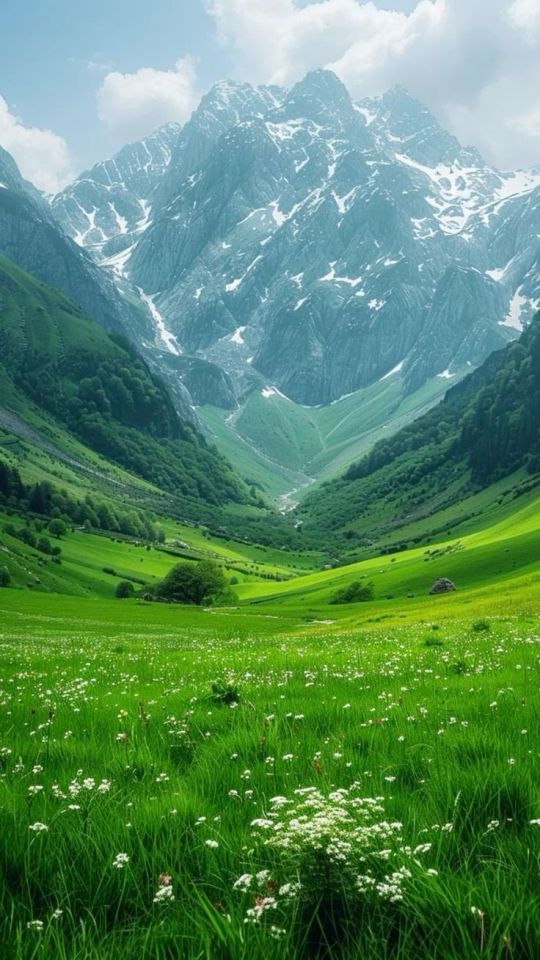
Switzerland, a small yet influential country nestled in the heart of Europe, stands out in many ways. From its awe-inspiring landscapes to its unique political system, Switzerland offers a blend of natural beauty, cultural diversity, and global diplomacy that few other nations can match. Its distinct character is a product of centuries of neutrality, innovation, and a deep respect for its heritage, all of which contribute to the nation’s unparalleled reputation on the world stage.
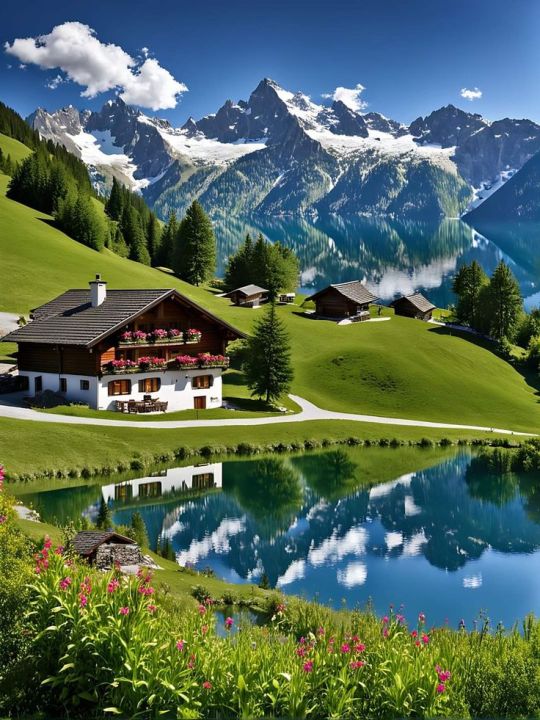
One of the first things that captivates visitors to Switzerland is its breathtaking scenery. The country is dominated by the majestic Alps, with towering snow-capped peaks that attract adventurers and nature lovers from around the globe. Whether it’s skiing in world-class resorts like Zermatt and St. Moritz or hiking through verdant valleys and along crystal-clear lakes, Switzerland offers outdoor experiences that are hard to rival. Beyond the Alps, the country is dotted with picturesque towns, lush meadows, and sparkling lakes, such as Lake Geneva and Lake Lucerne, each offering their own unique charm. The country's commitment to environmental preservation further enhances the beauty of these landscapes, ensuring that they remain pristine for future generations.
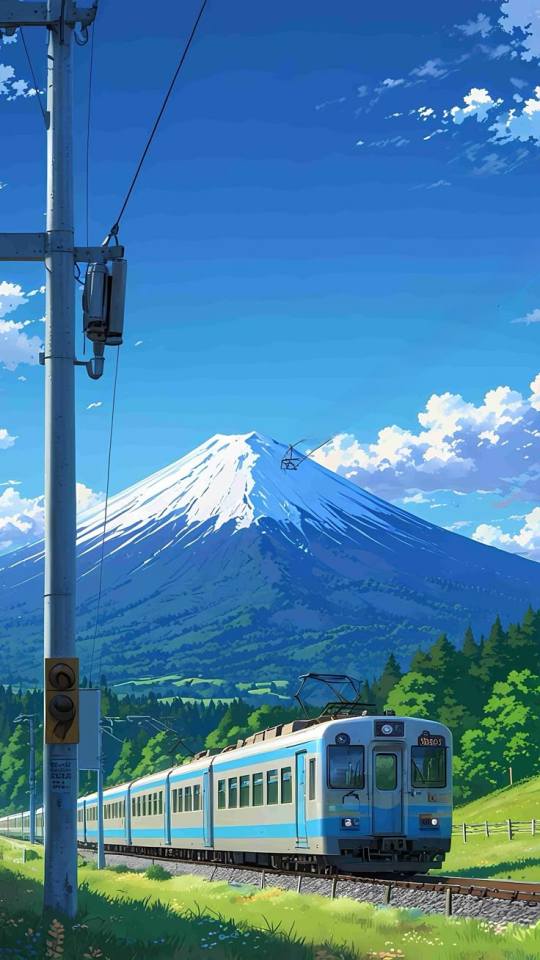
Swiss culture is characterized by diversity, which is reflected in diverse traditional customs. A region may be in some ways culturally connected to the neighbouring country that shares its language, all rooted in western European culture. The linguistically isolated Romansh culture in Graubünden in eastern Switzerland constitutes an exception. It survives only in the upper valleys of the Rhine and the Inn and strives to maintain its rare linguistic tradition.
Switzerland is home to notable contributors to literature, art, architecture, music and sciences. In addition, the country attracted creatives during times of unrest or war. Some 1000 museums are found in the country.
Among the most important cultural performances held annually are the Paléo Festival,��Lucerne Festival, the Montreux Jazz Festival, the Locarno International Film Festival and Art Basel.
Alpine symbolism played an essential role in shaping Swiss history and the Swiss national identity. Many alpine areas and ski resorts attract visitors for winter sports as well as hiking and mountain biking in summer. The quieter seasons are spring and autumn. A traditional pastoral culture predominates in many areas, and small farms are omnipresent in rural areas. Folk art is nurtured in organisations across the country. Switzerland most directly in appears in music, dance, poetry, wood carving, and embroidery. The alphorn, a trumpet-like musical instrument made of wood has joined yodeling and the accordion as epitomes of traditional Swiss music.
references: Switzerland - Wikipedia
62 notes
·
View notes
Text
Thinking about Germany nowadays is so depressing. Federal Germany was such a fucking mistake like I know Stalin had good reasons for doing what he did but god do I wish the Red Army kept going till they hit the Atlantic.
Or at least the Rhine like even if the world still had to suffer the rest of Western Europe at least they could have actually removed the Nazis from power instead of hanging a few and giving the rest their jobs back. I hope the US and France and Britain never live down their Re-Nazification and every German liberal who brags about learning and changing as a nation since ww2 can just go kill themselves
49 notes
·
View notes
Text


The Tale of Two Cities according to Heiko and Stephi - Part 437
Next week, after six weeks of summer break, school will start again. At least in Bavaria it will start again, that is. In most other German states it has already started.
Germany is a federal system consisting of 16 states. Education and everything connected to it, is up to the federal government. Therefore school holidays in different states are at other times.
Heiko lives in Cologne which is in North Rhine-Westphalia. It is the German state in which summer break starts earliest. This year it was from June, 22nd to August, 4th.
I live in Munich which is in Bavaria and it is the state with the latest summer break. This year it started on July, 31st and will end tomorrow, September 11th.
So North-Rhine-Westphalia and Bavaria have only one week of summer break at the same time.
How is it in the area you live?
102 notes
·
View notes
Text
FRANKFURT (Reuters) -German police said they were holding a 26-year-old Syrian man in custody on Sunday after a knife attack in the city of Solingen in which three people were killed and eight injured, adding that they were looking into the suspect's possible links with Islamic State.
The incident, along with the militant group's claim of responsibility, sparked concern among some politicians who urged enhanced security, tighter curbs on weapons, stiffer punishment for violent crimes, and limits to immigration.
The attack occurred during a festival on Friday evening in a market square where live bands were playing to celebrate Solingen's 650-year history. Mourners made a makeshift memorial near the scene.
The suspect turned himself in late on Saturday and admitted to the crime, Duesseldorf police and prosecutors said in a joint statement early on Sunday.
German federal prosecutors identified the Syrian man as Issa Al H., omitting his family name because of German privacy laws, and said he was suspected of being a member of Islamic State.
Prosecutors said "due to his radical Islamist convictions" he tried to kill as many people as possible that he considered to be non-believers, stabbing them repeatedly in the neck and upper body.
Friedrich Merz, a prominent politician who leads the opposition, centre-right CDU party, said the country should stop admitting further refugees from Syria and Afghanistan.
"It's enough!" he said in a letter on his website.
The suspect came from a home for refugees in Solingen that was searched on Saturday, North Rhine-Westphalia's interior minister, Herbert Reul, said.
Der Spiegel magazine, citing unidentified security sources, said the suspect had moved to Germany late in 2022 and sought asylum.
The Islamic State group described the man who carried out the attack as a "soldier of the Islamic State" in a statement on its Telegram account on Saturday.
On Sunday, the group posted two clips on its Telegram account of what it said was the attacker. The first purportedly showed the masked man pledging allegiance to the Islamic State leader, and the second, in which his face was blurred, allegedly showed him speaking moments before the attack.
Hendrik Wuest, premier of the state of North Rhine-Westphalia where Solingen is located, on Saturday described the attack as an act of terror.
Germany's Federal Criminal Police Office (BKA) has said there have been around a dozen Islamist-motivated attacks since 2000. One of the biggest was in 2016, when a Tunisian drove a truck into a Christmas market in Berlin, killing 12 and injuring dozens.
"The risk of jihadist-motivated acts of violence remains high. The Federal Republic of Germany remains a direct target of terrorist organizations," the BKA said in the report earlier this year.
7 notes
·
View notes
Photo
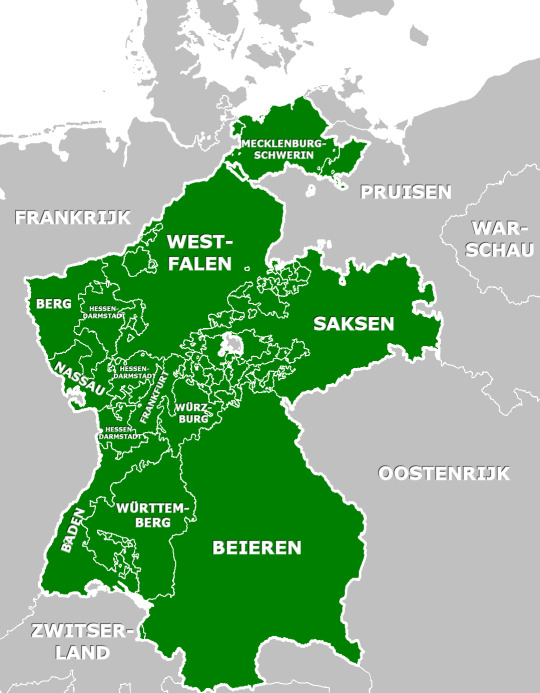
Map of The Confederation of The Rhine.
The Confederation of the Rhine was a client state of First French Empire. It existed from 1806 through 1813. Its ruler was Napoleon I of France, called "Protector of the Federation".
84 notes
·
View notes
Text

ESA-DLR lunar analogue facility inaugurated
LUNA, Europe’s new ‘Moon on Earth’, is set to play a pivotal role in shaping the future of lunar exploration.
The inauguration of LUNA, the lunar analogue facility operated jointly by ESA and the German Aerospace Agency (Deutsche Zentrum für Luft- und Raumfahrt, DLR), took place on 25 September in Cologne, Germany.
The facility, which is designed to recreate the lunar surface, is located next to ESA’s European Astronaut Centre and will be used to prepare astronauts, scientists, engineers and mission experts for living and working on the Moon.
It will facilitate research, development and integrated testing of space technology under realistic conditions, providing valuable insights for upcoming lunar missions, such as NASA's Artemis programme, which will send astronauts to the Moon for the first time in over 50 years.
ESA Director General Josef Aschbacher said, "The opening of LUNA marks a significant milestone in Europe’s space exploration efforts. This unique facility, with its ability to replicate lunar conditions, advances our understanding of the Moon and prepares us for future missions. We are proud to lead this project, which positions Europe at the forefront of lunar exploration and beyond, while also fostering international collaboration in space research.”
Guests from the space sector and governmental officials attended the inauguration of Europe’s cutting-edge space research facility, including ESA Director General Josef Aschbacher, Chair of the DLR Executive Board Anke Kaysser-Pyzalla, the Minister President of North Rhine-Westphalia Hendrik Wüst, alongside Deputy Minister-President of North Rhine-Westphalia Mona Neubaur and the Federal Government Coordinator for German Aerospace Anna Christmann, as well as representatives of NASA.
"LUNA will contribute to optimising our preparations for activities on the lunar surface through research into technologies and innovation for space exploration. This involves robotics as well as artificial intelligence, the utilisation of local resources and resource-conserving cycles all the way through to regenerative energy systems. LUNA provides a unique array of elements for scientific research and technological development under one roof. In its role as the ‘Moon on Earth’, LUNA will sustainably support activities on the Moon from Germany," says Anke Kaysser-Pyzalla, Chair of the DLR Executive Board.
"LUNA represents a major leap forward in our efforts to prepare for human exploration of the Moon and beyond. By replicating the lunar surface and providing vital insights into surface operations, this facility will help us address the challenges of future space missions. Partnering with DLR on this project highlights the power of international collaboration and our shared commitment to advancing space exploration together," commented ESA Director of Human and Robotic Exploration Daniel Neuenschwander.
LUNA features a 700-square-metre area that replicates the Moon’s surface using 900 tonnes of basalt-derived volcanic grains and rocks, processed to create a material known as ‘regolith simulant’, providing a unique testing environment.
A deep floor area will allow for drilling and sampling up to three metres below the surface, enabling research on regolith including frozen lunar soil.
Meanwhile, a Sun simulator mimics the day and night cycles on the Moon, including the challenging lighting conditions found at lunar polar regions.
Advanced control rooms are linked in real-time to mission control centres in Germany and worldwide. In the future, the analogue facility will also be connected to the Lunar Gateway, or even the Moon itself for seamless mission simulations.
Additional features will soon be implemented such as a gravity offloading system to simulate the Moon’s one-sixth of Earth gravity and an adjustable ramp for testing mobility on lunar slopes.
LUNA is designed as an open hub, available to space agencies, academia, researchers, space industry, start-ups and small and medium-sized enterprises from all over the world.
5 notes
·
View notes
Text
when bribing people into selling classified information on the goings-on of a federal prison, rhine lab is nothing if not inclusive!

#insert that rhine lab pride month logo edit captioned ‘kirsten we did illegal human experimentation’ ‘yeah but we did it while lesbian’#truer by the day#i’ve barely read any of lonetrail at all but i REALLY like the feel of it so far. hype#cant wait for silence my beloved to do cool stuff#arknights
41 notes
·
View notes
Text
Secrecy and Deception Chapter 24
Back on Earth (Wattpad | Ao3)
Table of Contents | Prev | Next
This chapter is dedicated to @theagenderyeehaw
Event: Khrushchev demands the withdrawal of Western Troops from Berlin.
Location: Bonn, North Rhine-Westphalia, Federal Republic of Germany
Date: November 10, 1958
“How much do you want to bet on him bluffing?” Allied Control Council asked as she recounted Khrushchev’s latest threats against the Western powers in Berlin.
Six months to withdraw from Berlin and make it a free-demilitarized city or West Germany was against the ideals of the Potsdam Agreement.
It was nothing new. Germany had been dealing with threats against his life and personhood since he was born. The Soviets and their lackeys hated him for siding with the West and had made that clear time and time again.
Their threats had started to mean nothing to Germany because he knew no matter what he did to appease them, they would always hate him and want him dead, want the other one to be the real Germany.
Even the content of the threats wasn’t new.
The other Germany and her father wanted control over Berlin. The only thing standing in their way were the forces of his father and the other Western powers. No one wanted war.
So they needed to do what they could to get them to leave of their own free will. Thus, the threats.
Germany didn’t care about the accusations that he was violating the Potsdam Agreement. He knew it was just an attempt to get the other Germany some sort of moral high ground, some excuse to justify why they needed the Western powers to leave Germany’s land. Not the other Germany’s, but his land.
It was propaganda, plain and simple. Everyone knew so; Britain and his father didn’t even give it a passing glance, so used to the childlike claims coming from the Soviets in Berlin.
The only part of this current threat that was taken seriously was the Soviet claim that they would give the other German government complete control of all lines of communication into West Berlin, so the Western powers could only have communication into West Berlin with the other German government’s approval.
Germany had heard many stories of the Berlin airlift, and he knew there had to be ways of getting around a communication block without needing to involve the other German government, but it was still a very real threat.
West Berlin was an enclave. The other Germany had control of everything and everyone surrounding it. A repeat of the Berlin airlift could be costly. Germany just wanted them to leave him and his part of the city alone.
He hoped it was all an empty threat; he really did.
It seemed like it was just another one.
But with the threats to isolate the people in West Berlin…Germany couldn’t be confident it was.
• ───────────────── •
Event: Cuban Revolution
Location: Havana, Republic of Cuba
Date: January 1, 1959
It was a relief to feel the weight of the dictatorship leave his mind. Cuba felt himself relax for the first time since the dictatorship came into being, a relief sigh escaping his lips.
“Thank you,” Cuba said, even though he knew that the men who freed his mind could not hear him. They still had yet to enter Havana, where Cuba was, but he knew that they would be here soon, with Batista gone.
It was a welcome relief to have his mind solely his again.
He wished he hadn’t had to deal with that. The only solace he did have was the fact that it was nothing like the military government United States had put him under, and he still remained himself through it all.
He was glad to be freed. The fight had been going on since Batista originally took power, and Cuba had been biding his time since then, knowing it was only a matter of time before he was gone. Puerto Rico had been a firm companion through it all, always stopping by to visit Cuba to ensure he didn’t lose too much of himself.
Florida had tried, but United States kept him tied up in so many projects that his brother only stopped by once a year. Still, it was good to have friends. Cuba knew one of them would probably start planning a party to celebrate the end of the dictatorship.
Cuba was happy. Hopeful too. After sevenish years of dealing with Batista, he would now be receiving a new government, one that would, with any luck, allow Cuba to be himself, with no unrealistic expectations or forcing their will on him.
Cuba only wished that he had been allowed to fight, that he could have participated himself in removing the dictator. If there was one thing Cuba deposed more than anything, it was being controlled, being forced into the backseat like he was lesser or some sort of colony.
He knew it was unrealistic to expect that he would have fought in a revolution against the dictatorship when they controlled him so closely, but it was nice to dream about it, about looking Batista in the eye and reclaiming his identity, his autonomy.
Cuba had never really gotten that chance before. United States kept him out of negotiations with the Spanish Empire during his war of independence, and despite everything that United States had done to him, Cuba had never been in a position to tell him off for it.
So many things in his life had concluded without proper justice, proper closure.
Cuba didn’t get to shut down Batista himself, but he hoped that closure could be found.
How could one move on without it?
• ───────────────── •
Event: The Kitchen Debate
Location: Washington, District of Columbia, United States of America
Date: July 24, 1959
“Moscow and Dee should have teamed up and called them both idiots because, wow, that is one of the dumbest arguments I’ve ever heard, and I spent two hundred years listening to Britain justify his bullshit,” James deadpanned as they watched the broadcasting of the Kitchen Debate. America groaned, leaning back in his chair.
“I have never been more thankful to have missed an event ever,” he commented.
“And stuck me with the punishment of going instead,” District of Columbia joked as she sat next to America.
“Sorry, Dee, but it was better since Krushchev brought Moscow with him and not the USSR. A capital for a capital,” America pointed out. District of Columbia rolled her eyes.
“I’m not the capital. I’m the federal district that holds the capital,” she pointed out. America shrugged.
“And Moscow is an oblast, not the capital,” he said. District of Columbia groaned.
“Damn, we could have complained about that,” she said, causing Unorganized Territory to laugh.
“Did they even talk?” she asked. America shrugged, turning to face District of Columbia again.
“Hey, Dee, Nize wanted to know if you two even talked,” he said, passing on Unorganized Territory’s message, prompting a small thanks from the territory.
“We probably would have if we spoke more than a few phrases of each other’s language. We at least got to shoot each other the most annoyed look when we could tell one of them was saying something dumb, like that stupid ass argument from Krushchev. Even though Moscow should have been on his side, she looked like she hated that argument,” District of Columbia explained. America laughed.
“Well, yeah, it just completely ignores reality in favor of saying, ‘Oh, look how great and powerful and better we are.’ I imagine that Moscow would have preferred an argument based on reality,” James snarked, prompting a few snickers from Unorganized Territory.
“James isn’t a fan of it either. He’s been mocking it since we first heard it.” America deadpanned, slightly annoyed.
“Oh, come on, how can I not?”
“In his defense, arguing that the USSR is better because they have made more technical advancements since their creation, ignoring that some of that stuff is based on the work of Russian Empire and that they inherited their country from Russian Empire. Meanwhile, you had to build your nation out of nothing, ignoring that you were born before the Industrial Revolution, that you contributed to the Industrial Revolution, and that a lot of their ‘new’ technology is just based on your work…it deserves to be mocked,” District of Columbia pointed out, raising her eyebrow.
“I never said it wasn’t stupid,” America responded.
“It’s so stupid it’s almost funny,” Unorganized Territory said. America nodded in agreement.
“Yeah, you’re right. I don’t know what anyone expected this ‘debate’ to do. It’s just…kinda petty and dumb,” he said before turning off the TV. “I have more important things to do than learn that Khrushchev doesn’t know how the passage of time works.”
District of Columbia snorted in amusement as America left the room.
He needed a nap.
#countryhumans#statehumans#countryhumans america#historical countryhumans#secrecy and deception by weird#countryhumans germany#countryhumans west germany#countryhumans cuba
3 notes
·
View notes
Text
【 Shining Nikki TW+CN 】
Main Story “Myerson”
Volume 2 Chapter 15 “The pending resolution”




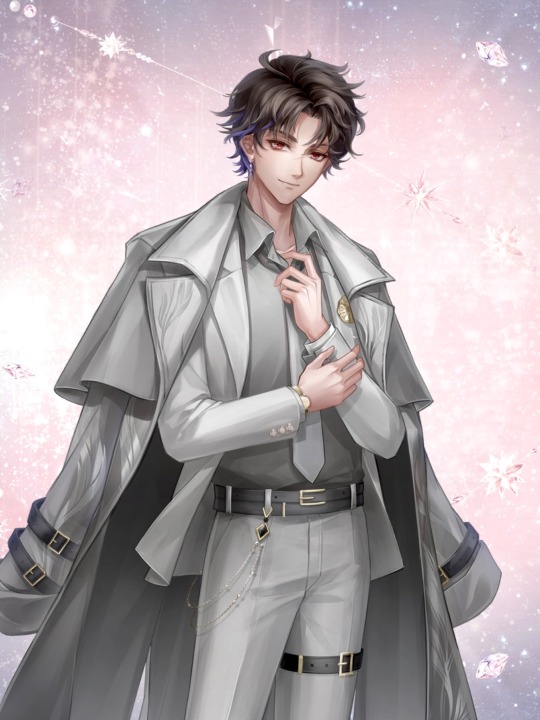
【 Shining Nikki TW+CN 】
Main Story “Myerson”
Volume 2 Chapter 15 “The pending resolution”
"Dangling Resolution"
Negotiation is a battlefield without gunpowder,
When the smell of gunpowder is strongest,
It only takes one small flame to make a bigger mess,
The door of the Myerson Federal Conference Room suddenly flung open,
The voices of the debate between the important officials of the Apple Federation and the Northland Kingdom were cut off immediately.
The calm and calm footsteps are very different in the silent and tense meeting,
Who is the uninvited guest who stepped into the council hall?
"Nice to meet you, I'm Rhine Mercury."
The dark fog filled the venue at some point,
Entrenched in the dome of the hall, like eyes looking down indifferently.
The faces of the noisy people were distorted, and the peaceful appearance was torn apart abruptly.
The strong malicious fission created countless gullies, blocking all channels of communication and reconciliation.
Is the mist created by the human heart, or does the mist distort the human heart?
Suit Display ::
Original :: Beautiful Night Fashion (旖夜风尚)
Recolor :: Beautiful Night Wind (旖夜風尙)
Collection :: Federal Style
Designer :: Ryan or Rien (瑞因)
Rarity :: SR
Attribute :: Sweet
Date :: 11/05/2023…..
Type ::
Main Story • Vol.2 Ch.15
(Workshop Design) (Journey Suit) (Chapter Sets)
#Federal Style#Main Story#Main Story Vol.2#Workshop Design#Journey Suit#Chapter Sets#Ryan#Rien#SR#Sweet#閃耀暖暖#闪耀暖暖#Shining Nikki#Nikki 3D#Nikki Up2U 4#Nikki 4#Orangecatty#3D Dress-Up Game#Nikki Diary Thailand#2023
60 notes
·
View notes
Text



Searches were carried out in Berlin, Lower Saxony, North Rhine-Westphalia and Schleswig-Holstein. A spokesperson for the Senate Interior Administration said that more than 300 police officers took part in the raids of 15 properties, 11 of them in Berlin. Seven searches concerned Hamas, and four Samidoun. Germany's Interior Ministry says that there are around 450 Hamas members in the country. According to German authorities, their activities include influencing political and social discourse in Germany and financing and fundraising to strengthen the organization. DW's political correspondent Matthew Moore said questions had been raised whether it would have been wiser to "carry out the ban of the organizations and the raids at the same time." A concurrent operation would have prevented members being able to destroy evidence, but that was not possible, Moore said. A week ago, authorities also conducted nationwide searches of 54 locations across seven federal states connected to the Islamic Center of Hamburg, suspected of supporting the militant group Hezbollah.
14 notes
·
View notes
Text
Taylor

Artist: 贺崽
Voice Actor: Mizuki Nana
A super idol from the Rhine Federation. Her album "Magic Bubble" was on the top of the charts for 28 consecutive weeks. She is secretly a member and the biggest sponsor of "Noisy Bat".








A super idol from Rhine Federation. Her album "Magic Bubble" was on the top of the chart for 28 consecutive weeks. Her real identity is a member of "Noisy Bat" and also its biggest sponsor.
0 notes
Photo

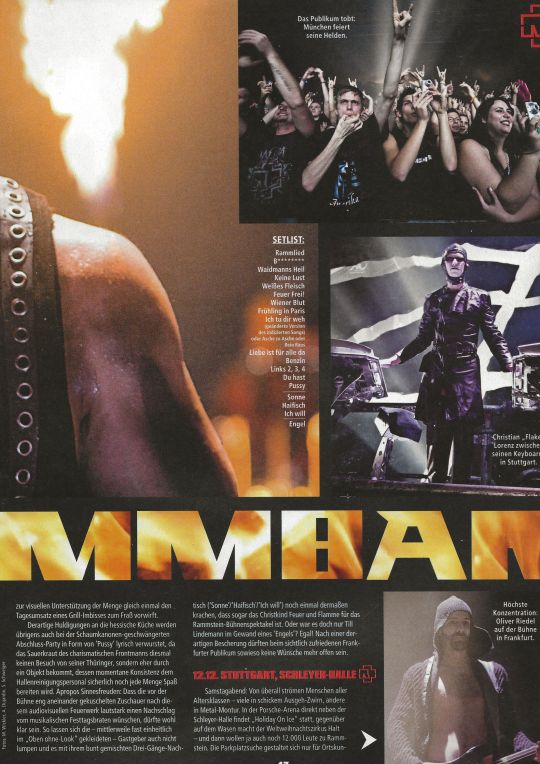

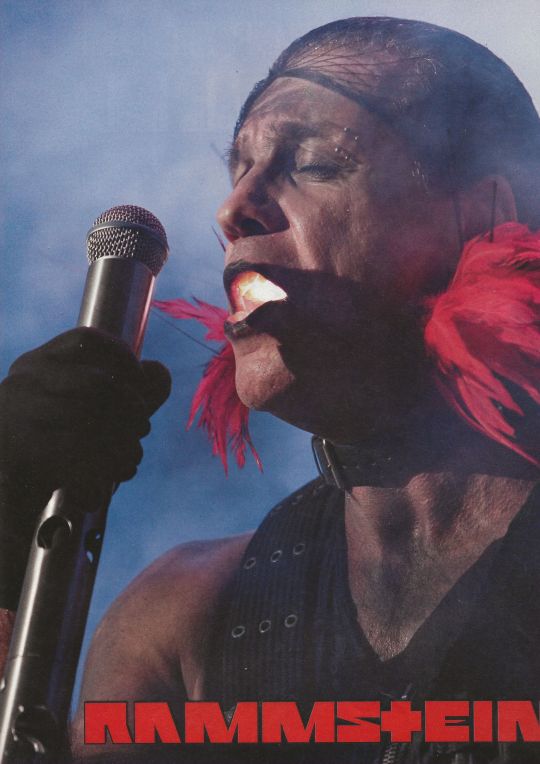
Metal Hammer - February 2010
The spectacle continues: Rammstein pull a fire trail through Germany with their Liebe ist für alle da tour. After Metal Hammer dedicated itself to three concerts in the previous edition, the journey now continues to Frankfurt, Stuttgart, Hamburg and to the home game in Berlin. Did only the stage burn on site or did the audience as well?
11.12. Frankfurt, festival hall
It's December 11th, 2009. The whole Rhein-Main area is infected by the Rammstein virus! The whole Rhine-Main area? No! But in order to make at least a small part of this diagnosis, you don't need a doctorate these days. Hundreds of party-mad Rammstein fans transform the extensive area in front of the magnificent Frankfurt Festhalle into their very own Christmas market. Here - punctually until the first chime - the merchandising bus is on the lookout for a gift for loved ones, people ask for admission to the Holy of Holies at the gates of (heaven) or at one of the countless stands the cold season with delicious mulled wine neutralized. The only difference to Nuremberg, the capital of Christkind: Here, instead of 'Last Christmas' or 'Jingle Bells', it's mainly these that get through.
Big hit from the Berlin scene institution from the Munich of the proud ticket holders. ‘Silent Night’ is definitely different.
In the circus ring-like interior of the location, the first thing to say is: wait for the Christ Child. Instead of shortening the whole thing with a speech by the Federal Chancellor, the industrial rockers from Combichrist try to heat things up today - which, however, meets with a similar amount of enthusiasm from large parts of the audience. Whether that's why the dedicated Norwegians chose their catchy tune 'WTF Is Wrong With You People?' as the official end of their tryst is anyone's guess.
After that, it's finally time for tonight's main attraction. With their spectacular debut, they immediately gave the term 'Freemasonry' a new definition. However, even such rock light figures as Rammstein - as in most tour stations before - need a two-part start-up phase ('Rammlied'/B******') at the beginning until the first decent cracker of the evening. Such explosive titles can be taken literally, because when the attack is blown with 'Waidmanns Heil', not only the pyro effect premiere heats the mood barometer up to the boiling point. Since the set list of the six capitals is identical to the previous gigs of the tour, the band's Die Hard fans are particularly excited about the 'polarizing' anthem 'Ich tu Dir weh' and the answer to the question 'How do Rammstein avoid the indexing this time? '. And how do the Neue Deutsche Härte initiators solve this problem? Actually as always: Namely with their very special sense of humour. Instead of singing about urinary canals, Till prefers to sing about other messes in the form of Frankfurter sausages, of which he immediately throws the daily turnover of a barbecue snack to the crowd for visual support.
Incidentally, such homage to Hessian cuisine is also lyrically spoiled at the foam cannon-laden closing party in the form of 'Pussy', since this time the charismatic frontman does not receive a visit from his Thuringian, but rather from an object whose current consistency resembles the hall cleaning staff will certainly be a lot of fun. Speaking of sensual pleasures: it should be clear that the audience, whispering close together in front of the stage, loudly want a second helping of the musical festive roast after this audiovisual firework. The hosts — who are now almost uniformly dressed in a 'topless look' — don't splash out either and let it rip with their colorfully mixed three-course dessert ('Sonne’/‘Haifisch’/‘Ich ‘will). that even the Christkind is hooked on the Rammstein stage spectacle. Or was it just Till Lindemann in the guise of an ‘Engel’? Doesn't matter! After such a mess, the visibly satisfied Frankfurt audience should have nothing to wish for anyway.
12.12. Stuttgart, Schleyer Hall
Saturday evening: People of all ages stream from everywhere — many in smart endured thread, others in metal gear. 'Holiday On Ice' takes place in the Porsche Arena right next to the Schleyer Hall, opposite on the Wasen the world Christmas circus stops - and then 12,000 people also want to see Rammstein. The search for a parking space is only unproblematic for those who know the area. It's cold outside, freezing cold even, so the anticipation of a warming pyro inferno increases even more. Although admission is from 7 p.m., there is still a very long queue just before 8 a.m. Everyone is shivering, teeth are chattering, deposit collectors are loading plastic bags and shopping carts full, the atmosphere is relaxed and peaceful. Wearers of glasses are also safe, because VfB-Wüterich Jens Lehmann is already in Mainz to prepare for the game against FSV.
Due to the barcode check of the tickets and precise scanning controls, progress towards the hall entrance is very slow. What seems annoying when queuing in the freezing cold turns out to be a stroke of luck. At least for those who no longer have to endure the entire Combichrist performance. The first few rows still seem to like it — it's all a matter of taste.
It gets dark at 9 p.m. sharp and Rammstein break through the stage decorations to greet the audience with 'Rammlied'. During ‘Waidmanns Heil’ — a real hit live — the first pyros take to the air. The interlude in ‘Feuer Frei!’ is also cool, when singer Till and guitarists Richard Z. Kruspe and Paul H. Landers form a triangle and spit fire with flamethrowers. ‘Wiener blut’ is disturbing. The stage is decked out with baby dolls on meat hooks. The babies burst, the lights go out and the relaxing sounds of ‘Frühling in Paris' ring out. So far it's an extremely atmospheric show, which unfortunately suffers a bit from the heavy, undifferentiated sound. This not inconsiderable shortcoming is eliminated from ‘Asche zu Asche’. Yes, that's right, 'Ich tu dir weh finally flies out of the set list in Stuttgart and is replaced by 'Asche zu Asche'. Good thing, because this song is better anyway.
From now on the guitars finally riff powerfully and vehemently with an overwhelming sharpness. Keyboarder Christian ‘Flake’ Lorenz climbs into a container, onto which Till fires volleys from a pedestal several meters above the ground until said container explodes. Seconds later Flake gets up in a glittery silver costume and takes his place on a treadmill in front of his keyboard. Cool. 'Benzin', with a low-squatting and wildly banging Till, is another high point until the band march out of the retractable floor onto the boards in lockstep on 'Links 2 3 4'. In contrast to earlier days, Rammstein exude enormous joy in playing. The consistently agile musicians communicate on stage and, despite the tight, rigid choreography, present themselves in a relaxed and sympathetic manner. No sign of static. And that, although it certainly requires enormous concentration in order not to be charred by the pyros fired from all possible corners of the stage, which is multifacetedly illuminated.
During ‘Du hast’, the audience, who is becoming more and more euphoric every minute due to the increasingly dramatic show, ducks their heads to avoid a ‘boomerang arrow’ shot by Till. The well-known encores with Flake's rubber dinghy ride during 'Haifisch' and the brilliant finale 'Engel' end a rousing concert by what is probably the most entertaining and entertaining live band on the entire music scene at the moment. Richard Kruspe jumps into the ditch to shake hands. Rammstein are not as aloof and distant as they often seem. When Till finally says goodbye to the exhausted crowd with his first announcement, 'Thank you for the wonderful evening, Stuttgart', you don't have to be a mentalist to read the audience's thoughts: 'You're welcome. All ours.'
14.12. Hamburg Color Line Arena
The Hanseatic city of Hamburg has always been a good place for the heroes of German rock music. Like every concert on this tour, the Color Line Arena right next to the HSV stadium is of course completely sold out. A good 12,000 Rammstein fans - that looks like something. To use the time until the Rammstein gala sensibly, there are two options tonight: Either you watch Combichrist, or you refresh yourself with delicious local beer specialties. In Hamburg they are called Holstein. The bulk of the 12,000 rodent collectors agree to do both, although the interior space is still noticeably thinned out.
Quite different then at 9 p.m. sharp. When the protagonists 'sweat' their way through the papier-mâché wall and are illuminated from behind with an estimated 6,000 watts, the cheering in Hamburg knows no bounds - just like in every city. Rammstein know how to present themselves and are successful every time. Compared to previous tours, there is a little less fire and pyrotechnics at the start, but that's whining at a high level, after all there are few or no bands that can even remotely match Rammstein in terms of show.
And the sextet also has great songs. As with some concerts on the current tour, the sound had to be adjusted a little during the set in Hamburg, because Till's singing came across as a bit undifferentiated. However, those responsible for the Rammstein live sound have this under control very quickly. In this way, no questions remain unanswered, because the answer is always: Rammstein.
Although: That's not entirely true... Question one that he needs to clarify: Are Rammstein playing 'Ich tu dir weh’ again today? Answer: No, unfortunately not - but 'Asche zu Asche' is certainly one of the biggest songs in the Rammstein canon, so that there is only limited scope for complaining.
The following explanation on this subject was posted on December 12, 2009 on the Rammstein Facebook page: « From today on, the instrumental version of 'Ich tu dir weh' will no longer be performed in Germany, since access to the concerts restricted to persons under 18 years would otherwise not be permitted. » Question two, and that's also the case throughout the tour: Do eight (!) new songs really have to be in a 90-minute set? Sure, as a musician you want to play your new material specifically, but there's no denying that so many other hits fall by the wayside. No 'Moscow', no 'Americk’, no 'Mein ‘teil, no 'Mein herz brennt’, no ‘Du riechst so gut’, no ‘Heirate mich’ - the list could go on and on.
Keyboarder Christian 'Flake' Lorenz cannot be at the show today due to an infection. Till Lindemann speaks to the audience personally and does the customer service, but also says that the show was not to be canceled under any circumstances. Alf Ator (formerly Knorkator) was hired as a short-term substitute. Purely in terms of playfulness, there is no loss of quality, only Flake's famous 'dance numbers' are not part of the show today. But Hamburg gets over that too, because the grand finale with 'Ich will' and 'Engel' is exactly to the taste of the Rammstein Die Hards: big Rammstein numbers with an exorbitant hands-on factor. In general, Rammstein naturally convince with a first-class overall performance, even if a number of older hits have to be left behind due to the many new songs. This is still to be discussed. Otherwise, the same applies as before: Rammstein are the power!
18.12. Berlin, Velodrome
Home game! And four times in a row. At their last concerts before Christmas, Rammstein will be honored in the Berlin Velodrom. A difficult task for Combichrist — at least one would think so. But the Norwegians work hard to get the crowd on their side. And they succeed in large parts, they can even encourage you to sing along. Interaction, on the other hand, is not exactly what Rammstein is counting on. Rather, they offer a perfectly staged show. At 9 p.m. Rammstein start the spectacle, which tears the last Berliner out of the winter depression who had to stand in line at minus 7 degrees.
Richard Kruspe and Paul Landers smash their axes through the black stage wall, emerge from the glare of the background — towards the crowd. Till Lindemann bursts onto the stage from the middle of the wall. The beginning of the concert is like giving birth. In contrast to Hamburg, keyboarder Christian ‘Flake’ Lorenz is part of the show again.
You can rely on Rammstein's game with fire and other effects. It has a martial effect when Lindemann squats down, as in 'Benzin', slaps his thighs, bangs wildly and spurts fire in the background. Instead of 'Ich tu dir weh’, the gentlemen in Berlin bring 'Rein Raus' - the audience thanks it and rages. As an ‘Engel’ with silver wings, Lindemann finally releases the visitors from the heat of the velodrome into the cold of the night.
#Rammstein#Till Lindemann#Flake#Paul Landers#Oliver Riedel#Richard Kruspe#2009#2010#*scans#review#translation#*
64 notes
·
View notes
Text


The tale of two cities according to Heiko and Stephi - Part 414
Germany is a federal government and the different German states can have some different laws. The laws concerning opening hours vary from state to state. North Rhine-Westphalia isn't as strict as Bavaria is. In Bavaria, everything except for gas stations and restaurants have to close after 8pm and on Sundays. There are some exceptions for shops in bigger train stations or airports, but everywhere else, every shop is closed then. When you want to buy beverages, cigarettes, snacks or something else after 8pm you need to go to the next gas station (or bigger train station) or wait until the next day.
In Cologne and in other German cities there are "kiosks" that have longer opening hours. I know that in Berlin they are called "Späti" ("spät" means late). In Heiko's photo (the first photo) I can see, that they are also called "Späti" in Cologne.
When people from another part of Germany come visit Munich or start to live here, I often hear that they miss these kinds of "kiosks", because the few "kiosks" we have here also close early. In case you don't know, a "kiosk" is a "mini shop" often close to a train station where you can buy beverages, newspapers, cigarettes but they have the same opening hours as every other shop here has.
But I found this E-Kiosk in Munich though, which you can see in the second photo. It is open 24/7 but there are only vending machines in it.
How are the opening hours in the area you live in?
93 notes
·
View notes
Text
SOLINGEN, Germany (AP) — German Chancellor Olaf Scholz vowed to toughen knife laws and step up deportations of rejected asylum-seekers Monday as he visited the scene of the knife attack in which a suspected Islamic extremist from Syria is accused of killing three people.
Scholz, speaking after he joined regional officials in laying a white rose at a makeshift memorial in the western city of Solingen, said he was “furious and angry” about the attack, in which eight people also were wounded.
The suspect turned himself in to police on Saturday evening, a day after the attack at a festival marking the city's 650th anniversary. Federal prosecutors said Sunday that he shared the radical ideology of the Islamic State group, which he joined at a point that remains unclear, and was acting on those beliefs when he stabbed his victims repeatedly from behind in the neck and upper body.
The 26-year-old had had his asylum application rejected and was supposed to be deported last year to Bulgaria, where he first entered the European Union, but that failed because he disappeared for a time, according to German media reports.
That has revived criticism of the government on migration and deportation, an issue on which it has long been vulnerable. It has taken steps to defuse the issue, for example with legislation intended to ease deportations of unsuccessful asylum-seekers that was approved by lawmakers in January. It also has launched legislation to ease the deportation of foreigners who publicly approve of terrorist acts.
“We must do everything to ensure that such things never happen in our country, if possible,” Scholz said of the attack. He said that would include toughening knife laws in particular “and this should and will happen very quickly.”
Interior Minister Nancy Faeser earlier this month proposed allowing only knives with a blade measuring up to 6 centimeters (nearly 2.4 inches) to be carried in public, rather than the length of 12 centimeters (4.7 inches) that is allowed now.
“We will have to do everything so that those who aren't allowed to stay in Germany are sent back and deported,” he said, adding that “we have massively expanded the possibilities to carry out such deportations."
Scholz said there had been a 30% increase in deportations this year already, but “we will look very closely at how we can contribute to raising these figures even further.” He said measures including border checks on Germany's eastern frontiers have reduced the number of migrants arriving “irregularly,” but there's room for improvement there too.
Following a knife attack by an Afghan immigrant in Mannheim at the end of May that left one police officer dead and four more people injured, Scholz vowed that Germany will start deporting criminals from Afghanistan and Syria again.
Germany does not currently carry out deportations to those countries. The government has no diplomatic relations with the Taliban in Kabul, and so far considers the security situation in Syria too fragile to allow deportations there. But Scholz said in June that his government was working on solutions to enable the deportation of convicted Afghans to Afghanistan’s neighboring countries, and there has been discussion in Germany about allowing deportations to Syria.
Critics say there has been little movement since. Interior Ministry spokesperson Sonja Kock said Monday the government is still working “intensively” on that.
Scholz spoke alongside Hendrik Wüst, the governor of North Rhine-Westphalia state and a member of Germany's mainstream conservative opposition, which has long criticized the government on migration. He said was “thankful” that more action had been announced but “announcements alone won't be enough.”
“Action must follow,” Wüst said.
Opposition leader Friedrich Merz, the leader of Wüst's Christian Democratic Union, complained on ARD television Sunday evening that “we have been discussing the consequences of Mannheim for three months ... it's enough. We must now do something together.”
“We have people in Germany we don't want to have here, and we must ensure that we don't have even more coming,” Merz said, arguing that such migrants should be turned back at the country's borders.
The Solingen attack came ahead of state elections this weekend in two eastern regions, Saxony and Thuringia, in which the far-right Alternative for Germany party is very strong and the parties in Scholz's three-party coalition already looked set for dismal results.
6 notes
·
View notes
Text
Word count: 143,208
Relationships: Germany/North Italy, Canada/Prussia, South Italy/Spain, England/France etc.
Characters: Germany, Prussia, North Italy, Canada, Spain, Austria, Hetalia Original Character(s), Hesse, Brandenburg, Saxony, Bavaria, Thuringia, North Rhine-Westphalia, Rhineland-Palatinate, Lower Saxony, Saarland, Quebec, Ontario, Manitoba, Tyrol, Salzburg etc.
Summary:
“Have you met the nations before? You know, apart from our neighbors?” “As the Grand Duchy of Hesse, yes, but as a federate state of Germany, no.”
The year is 1991. One year after the reunification of Germany. Two years after the fall of the Berlin Wall. When West and East Germany are unable to attend the world summit in Strasbourg, it is up to their most trusted federate states to represent them. But what starts out as a great opportunity to meet the nations for some, eventually ends as a nightmare for all. One that is far from short-lived, because when Ludwig and Gilbert remain missing, their loved ones are quick to discover that the reunification of the two sides of Germany isn’t what Wolfgang made believe.
Meanwhile, Italy and Canada have to question the friendship they share with the German brothers. How does Feliciano cope with the aftermath of "Buon San Valentino" as well as Germany’s states, whose approval he should now seek? And how will Matthew know what a seemingly innocent kiss between two forgotten souls means?
#its been what? three months?#of struggle?#im exhausted#it has taken too long for this chapter to see the light of day#and i couldnt be happier#hetalia#hetalia fic#hws germany#hws gerita#hetalia oc#hws hesse#ocmusings
2 notes
·
View notes